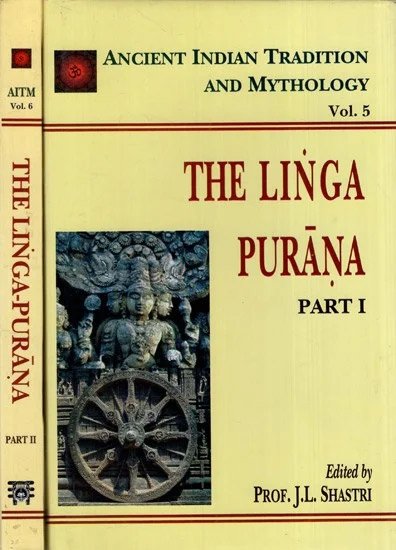The Linga Purana
by J. L. Shastri | 1951 | 265,005 words | ISBN-10: 812080340X | ISBN-13: 9788120803404
This page describes Enlightenment of Vishnu (vishnuprabodha) which is chapter 19 of the English translation of the Linga Purana, traditionally authored by Vyasa in roughly 11,000 Sanskrit verses. It deals with Shaiva pilosophy, the Linga (symbol of Shiva), Cosmology, Yugas, Manvantaras, Creation theories, mythology, Astronomy, Yoga, Geography, Sacred pilgrimage guides (i.e., Tirthas) and Ethics. The Lingapurana is an important text in Shaivism but also contains stories on Vishnu and Brahma.
Chapter 19 - Enlightenment of Viṣṇu (viṣṇuprabodha)
Sūta said:
1. The Supreme Lord said: O excellent among the Devas, I am delighted with you. On beholding me, the great lord, you should cast off all fear.
2-3. Both of you very powerful were born of me formerly. Brahmā, the grandfather of the universe was born from my right side; Viṣṇu, the soul of the universe, sprang from my left side. I am extremely pleased with both of you. I shall grant you the boon of your choice.
4. After saying this, the lord, the storehouse of mercy patted Viṣṇu with his gentle and smooth hands out of compassion.
5. Then with a delightful mind, Viṣṇu bowed and spoke to the great lord who though devoid of Liṅga was stationed in the. Liṅga.
6. If love has been generated in you, if boon has to be granted to us, may our devotion to you remain perpetual and unswerving.
7. O Devas, the moon-crested lord accordingly granted them an unswerving devotion and faith.
8. Then Viṣṇu knelt on the ground and bowed to the lord. With perfect control over himself he spoke to the lord in low tones.
9. O lord of the Devas, our controversy has borne splendid fruits, since you yourself have corrie over here to remove the same.
10. On hearing this. Lord Śiva again spoke smiling to Viṣṇu who bowed to him with his head bent down and who stood with palms joined in reverence.
Lord Śiva said;
11. O lord of earth, you are the projector of dissolution, sustenance and creation. O dear Viṣṇu, protect this world with all its mobile and immobile beings.
12. O Viṣṇu, I am lord Siva, the unsullied, I divided myself into three forms[1] under the names of Brahmā, Viṣṇu and Rudra with the activities of creation, protection and dissolution.
13. O Viṣṇu, abandon your delusion. Protect this Brahmā, who in the Padmakalpa, will become your son.
14. Then you will see me thus, so will the lotus-born Brahmā too. Thus saying the lord vanished there itself.
15. Ever since then the worship of the Liṅga was well established in the world. The great goddess is the altar for the Liṅga. The Liṅga is the great lord himself.
16-17. Liṅga is so called because, O gods, everything gets dissolved in it. The brahmin who reads this narrative of Liṅga, in the presence of the Liṅga image attains Śiva-hood. No doubt need be entertained in this respect.
